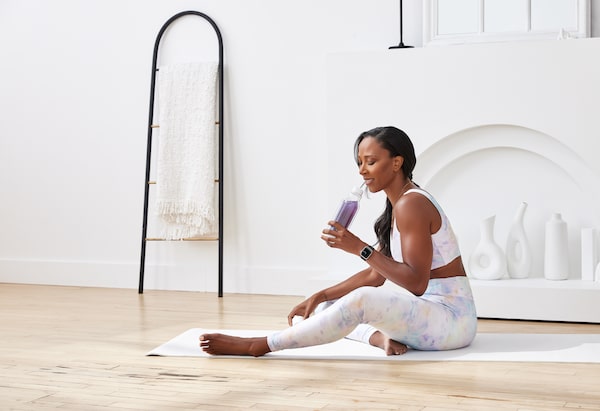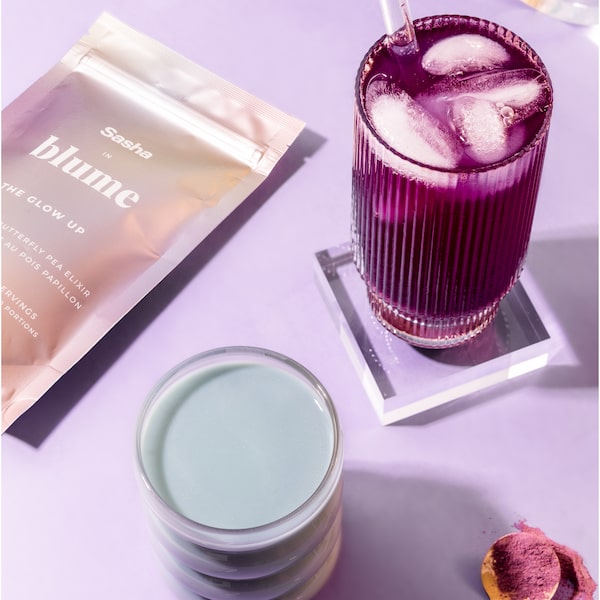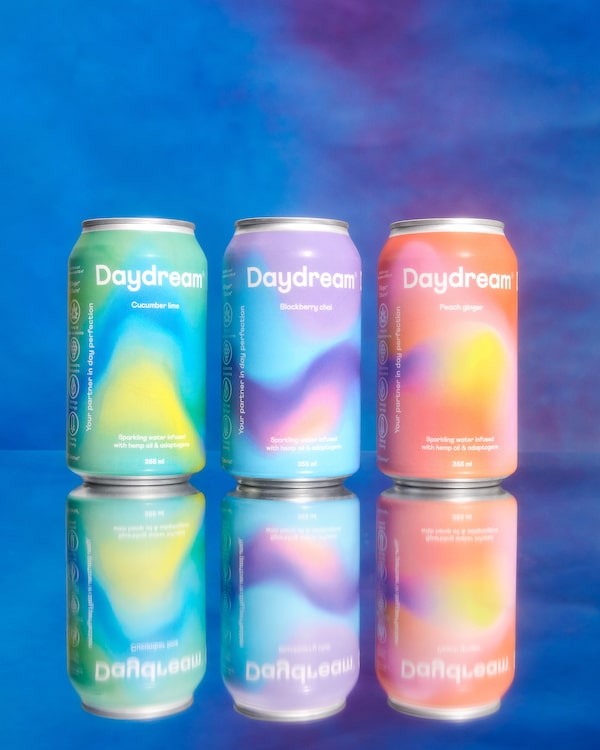
In collaboration with superfood latte brand Blume, content creator Sasha Exeter drew on her experience with autoimmune disorders to create a “water elixir” that supports gut health.
Coconut water is so 2020.
The hippest way to hydrate in 2022 is with drinks infused with CBD, adaptogens or biotic ingredients that claim to blend health benefits with tantalizing refreshment. While edible wellness options were already trending pre-pandemic, this category of functional beverages is making a bigger splash today thanks to – you guessed it – COVID-19.
“We’re having this collective sentiment of taking better care of ourselves and understanding that it’s our job,” says trend expert Carly Stojsic.
Behind the scenes, there’s a lot that has propelled these drinks to a store shelf near you. Stojsic cites the rising awareness of the importance of mental and physical health, increased interest in beauty and self-care rituals, as well as calls to take action on social and ethical issues such as sustainability as the key converging factors driving market growth. “All these topics become a witch’s brew for health-infused beverages,” she says.
The latest from “superfood latte” purveyor Blume is a prime example that ticks many of those boxes. The collection of powder blends in sorbet-hued pouches uses superfoods, such as blue spirulina, and adaptogens, like reishi mushroom, to level up your latte.
The brand recently joined forces with content creator Sasha Exeter to create The Glow Up Water Elixir. Inspired by Exeter’s own experience with two autoimmune disorders, it includes mood-enhancing butterfly pea, the prebiotic power of blackcurrant, hibiscus for antioxidants and rose petals which are high in vitamin C. When mixed with water, the purple powder creates an Instagram-friendly drink that’s light, refreshing and designed to support the gut-skin axis.
“It’s all wrapped up in enhancing the lived experience,” says Stojsic. “We’re thinking differently about things like simple hydration.”
The rise of the sparkling adaptogen
Alex Simonelli has had a front-row seat to this mindset shift since launching Daydream four years ago. The company’s plant-based wellness beverages feature adaptogenic ingredients, such as schisandra, moringa and ginseng, infused into sparkling water. “I saw it happening in real time,” says the founder and CEO.
Those key ingredients, he says, all aid the body in a natural boost of cognition, anti-inflammation and stress reduction by reducing free radicals in the brain and blood cells. Simonelli describes his product as a guilt-free drink that can help balance one’s endocrine system, which directly correlates to mood, mind and body.
Initially attracting a consumer base that was mostly female, aged 22 to 45, and often vegan, a broader demographic is now seeking out Daydream’s best-selling, sugar- and caffeine-free peach ginger and blackberry chai flavours.
“The key consumer now falls within three intersections, regardless of age or gender, and that’s [people who care about] mental health; wellness through fitness or cutting alcohol; and plant-based eating,” Simonelli says.
After two years of being on high alert for our health, it makes sense that we’re examining what we’re consuming more closely. “We want everything to have a multiplicity of benefits to it because we’re all running on very little bandwidth and resources,” Stojsic says.
With links to traditional Chinese medicine and Ayurveda, adaptogens have long been available in pill and powder form and are believed to increase the body’s ability to adapt and avoid damage.
“They likely stimulate a response against physical, environmental and emotional stress,” says Vandana Gujadhur, a registered dietitian, “and they help in restoring hormones and other biological markers to baseline levels when there is an imbalance.”
Can a liquid version also deliver? “Likely yes. However, the dosage or quantity may not be high enough to get health benefits,” says Gujadhur.
“Anyone with a specific health condition should consult with their health practitioner before consuming an adaptogen, as they can interfere with certain medications,” she adds.

Blume’s offering touts “superfoods” like reishi mushrooms, spirulina and adaptogens to boost the drinker’s wellness.
Cannabis’ surprise hit? CBD-infused drinks
Though it’s an ongoing area of scientific study in need of further exploration, we know CBD (cannabidiol) interacts with the human endocannabinoid system and is thought to impact natural chemicals within our bodies related to mood, stress, sleep and pain.
“So far, most research has been done in neuropathic and chronic pain, such as multiple sclerosis and diabetic peripheral neuropathy,” says Gujadhur. While current human studies are insufficient, she does point out the preliminary research that cannabis could benefit a wide range of conditions including irritable bowel syndrome, Tourette’s syndrome, glaucoma, migraines and more.
Nestled between edibles and topicals, these beverages claim a separate drop-down menu on the Ontario Cannabis Store (OCS) website. Among the options of CBD-dominant drinks (those with no or very low THC, the component of cannabis that causes psychoactive effects) you’ll find Quatreau sparkling waters, Basecamp iced tea, and a selection of Everie whole-leaf herbal teas.
“[CBD beverages] are one of the most palatable, digestible, and accepted entry points into hemp and cannabis usage, and that’s across generations,” says Stojsic. “In almost every cannabis shop that I go into I’m told the OCS runs out quickly on CBD drinks.”
If you’re rethinking how you unwind, cracking a can of CBD sparkling water could open new possibilities. “Taking CBD through a beverage is a convenient method and has long-lasting effects ranging three to nine hours, depending on the type of beverage and [your] stomach content,” says Gujadhur.
One slight drawback is it may take a bit of trial and error to find what suits you, and varying factors can impact outcome. “It can be more difficult to control the dosage as it may take 30 to 120 minutes to feel the effects,” she says. Slow and low remains the best advice for a foray into any form of cannabis.
In fact, moderation is key with any health-infused beverage. “At the moment, there is not enough research done in the area of health-infused beverages,” says Gujadhur, “A person who regularly consumes [them] in addition to a balanced diet and supplement intake may be at risk of exceeding the upper tolerable level of micronutrients.” Again, it’s always best to check with your doc.

Daydream’s founder describes their adaptogen-rich product as 'a guilt-free drink that can help balance one’s endocrine system.'
A generational shift
The bottom line is that most of us are on a mission to feel better, and are open to different products that offer various alternatives of what that may look like. Functional beverages reflect a desire for easy-to-consume products that can reduce anxiety, enhance comfort or provide a sense of ease.
This trend is being propelled in particular by millennials and Gen Z, who have been found to drink much less alcohol than their Gen X or Boomer counterparts. A 2018 study found that people in their teens and 20s were drinking 20 per cent less alcohol per capita than older generations at that same age.
“We’re looking at our lives as holistically as we can, and not just, I need coffee to keep me up and wine to relax,” says Stojsic.
“[People] are looking for something more than just water,” adds Simonelli. “There’s this entire group of underrepresented consumers that [are left to] drink a bottle of water while at a bar or music festival if they don’t want alcohol.” (Looking to meet that demand, Daydream will be debuting sparkling mocktail flavours soon.)
As we await the science, Stojsic predicts more functional beverages will hit shelves and appear on menus. “[These] drinks aren’t quick fixes, but they are a vehicle for convenience,” she says.
That said, what you can lean into for a reliable boost is always on tap. “Many Canadians are not consuming adequate fluids daily, typically less than 1 litre of water each day,” says Gujadhur, “This can affect their cognitive performance.”
The smartest move? Consider pairing your health-infused beverage with a chaser of good ol’ H2O.